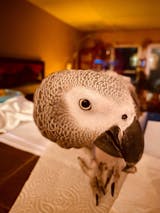Romeo’S
Skin is not dry anymore and his feathers look beautiful
This is amazing. My parrot has stopped plucking and his feathers look vibrant.
Wish I would have ordered this a long time ago.
My three Cockatoos have really benefited from this spray. Since not being able to get their outdoor showers regularly, this helps with the shine and texture of the feathers.
She has a round collar and chews her tail. I got this and no more taail chewing but she found her shoulders! Lol.
Very pleased with the vitamins.











